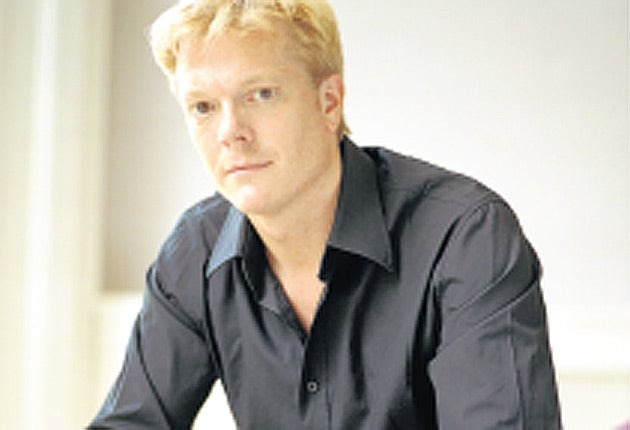Toby Spence - A rising star reveals his own Faustian pact
The tenor Toby Spence tells Jessica Duchen why his new role is apt

Your support helps us to tell the story
From reproductive rights to climate change to Big Tech, The Independent is on the ground when the story is developing. Whether it's investigating the financials of Elon Musk's pro-Trump PAC or producing our latest documentary, 'The A Word', which shines a light on the American women fighting for reproductive rights, we know how important it is to parse out the facts from the messaging.
At such a critical moment in US history, we need reporters on the ground. Your donation allows us to keep sending journalists to speak to both sides of the story.
The Independent is trusted by Americans across the entire political spectrum. And unlike many other quality news outlets, we choose not to lock Americans out of our reporting and analysis with paywalls. We believe quality journalism should be available to everyone, paid for by those who can afford it.
Your support makes all the difference.It's always nice when that great bloke who used to be in the advertising department turns up singing Faust at English National Opera. Years ago when I worked at Classical Music magazine, Toby Spence was selling its ads, using his persuasive tenor voice to earn a crust while trying to start his singing career. Today, preparing for his debut in the title role of Gounod's extravaganza, he's one of Britain's brightest opera stars.
Outwardly, he hasn't changed a bit: the auburn-haired good looks, ready wit and suave Oxford-honed manner are all just the same. But he has undergone more than one transformation. In January Spence, 41, astonished fans by publishing an article explaining why he identified so strongly with the role of the dissolute Tom Rakewell in Stravinsky's The Rake's Progress: it was, he said, the story of his own life. A public confession of his rakish past was, he says, a means of exorcising the pain behind it and moving on to a more serious modus vivendi.
"I have regrets, but I've also learned a lot and I don't want to be encumbered with that history any more," Spence declares. It had involved a failed marriage and the hedonistic lifestyle of a starry young playboy – in reality a desperate attempt, he realised, to escape the grief he buried when his mother died just after he left university. A former personal assistant to Yehudi Menuhin, she nurtured her son's love of music.
"Grief is not easy to come to terms with when you're that young," Spence recounts. "I thought that the strong, macho thing to do was to pretend everything was all right. That was the wrong choice. Someone warned me that it might come round and bite me when I wasn't expecting it, and it did. At last I realised that I had to say goodbye to Mum. Because if I did not, I was going to be damned."
It's an appropriately Faustian image: the legend immortalised by Goethe and seized upon by Gounod tells of an ageing scholar who sells his soul to the Devil in return for renewed youth and sensual pleasure. The story is likewise the source of The Rake's Progress: Gounod's Faust is Tom Rakewell's 19th-century predecessor, writ large.
ENO's new production of Faust is directed by Des McAnuff, the Tony Award-winner here venturing into opera for the second time (he previously directed Wozzeck in San Diego in 2007). He has updated the action, in Spence's view very effectively. Opening in the Second World War, McAnuff's staging presents Faust as one of Oppenheimer's scientists who has just returned from Japan having seen the atomic bomb's aftermath.
"As Des explained it, this was the moment in history when the notion of 'tomorrow will be all right' evaporated," says Spence. "Instead, the world could end tomorrow. Faust sees that all his work has gone towards destruction when he thought he was building for creation; disillusioned, he assigns himself to the devil. Then he goes back to the time of the First World War in France, and a tragic love story ensues."
Faust is Spence's biggest role to date. It's not one much associated with English tenors – not least because being an "English tenor" is, as Spence puts it, "a double-edged sword". This distinctive voice type is often regarded as too reserved and intellectual for the big dramatic roles, and few have had the appropriate range and volume to excel in them. Most rarely venture beyond smaller-scale baroque, classical and Britten operas, plus song recitals. Singing Faust certainly indicates that he's moving towards brawnier material.
"My voice has not developed more weight," he explains, "but it's become stronger and I think my technique has got better." The breakthrough, he says, was when he sang Elgar's The Dream of Gerontius for the first time last year.
"That's proper, grown-up singing, and my voice just grabbed it and opened up to it. It was like, 'why have we been waiting for this?'"
Toby Spence sings Gounod's 'Faust', English National Opera, from 18 September (0871 911 0200)
Join our commenting forum
Join thought-provoking conversations, follow other Independent readers and see their replies
Comments